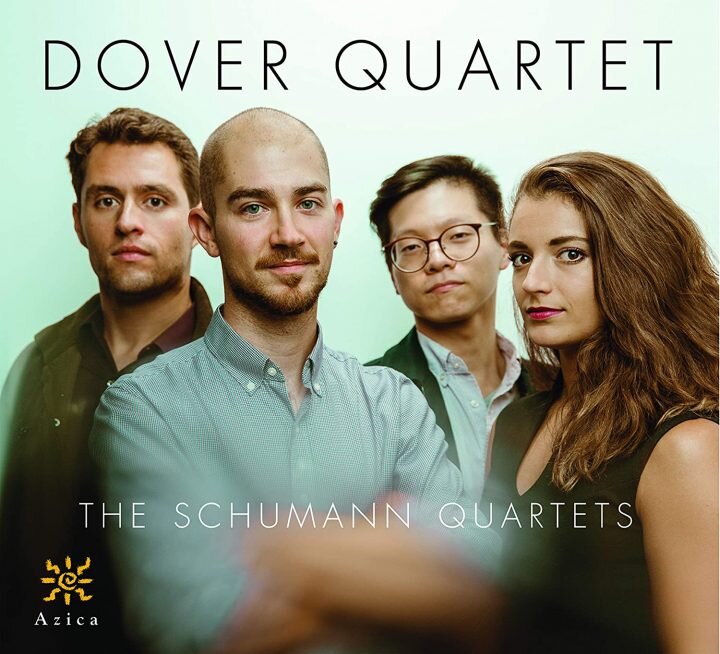by Jarrett Hoffman

In the Dover Quartet’s collection of all three works — released in fall 2019 on Azica Records and recently nominated for a 2021 Grammy Award for Best Chamber Music/Small Ensemble Performance — the ensemble captures not just remarkable bursts of energy, but more often patient and poised writing from a mature Schumann.
The first of the quartets, in a minor, is the most visceral, and the Dover revel in it. After unwrapping the opening bars, soon the players call you to attention with energetic crescendos and emphatic subito fortes. From there, the piece is off and running through dramatic emotions captured convincingly, like the vigorous galloping of the second movement, the beautiful — and beautifully built — third, and a finale that is irresistible both melodically and rhythmically.
Speaking of rhythm, Schumann shows his mastery in that area throughout the quartets with his distinctively off-kilter writing, often the result of dots and ties coming together in unexpected ways. Even in the few moments when the material doesn’t particularly stand out, Schumann finds a way to hold your attention with that signature ability.
The next two works are less prone to extreme shifts in mood. An interesting example is the first movement of the middle quartet, which feels easygoing as it traverses little hills and valleys of emotion. Then, to paint that point even more clearly, it flips the switch at the end with an emphatic cadence in major — a conclusion that feels satirical in comparison to what came before.
The opening of the third quartet, in A major, is one of the most compelling examples of this comparatively level-headed Schumann. Its slow introduction is followed not by a quick or joyful section, but instead by a graceful waltz full of subtle expression.
There are exceptions in both works, especially their finales, which grab you by the hand, toss you in the back seat, and just take off. That “Allegro molto vivace” in the third quartet isn’t just a feat in itself, it also allows the quartet to show off something particularly impressive: a series of triplets exceedingly fast yet delicate, and coordinated with the same pinpoint precision the Dover execute throughout the album.
In terms of ensemble skills, violinists Joel Link and Bryan Lee, violist Milena Pajaro-van de Stadt, and cellist Camden Shaw are a superb match, supremely unified in sound and musical intention. Their warm blend and crisp articulations are both made fully evident in this recording full of ring and clarity, produced by Alan Bise and engineered by the late Bruce Egre.
Reflecting again on that summer of 1842, we can rightly marvel at Schumann’s output, but statements like that also have a way of smoothing things over. Knowing what we do about his psychology, when we admire such a burst of creative inspiration, it’s important that we also keep in mind the other side of that coin.
Published on ClevelandClassical.com December 15, 2020.
Click here for a printable copy of this article


